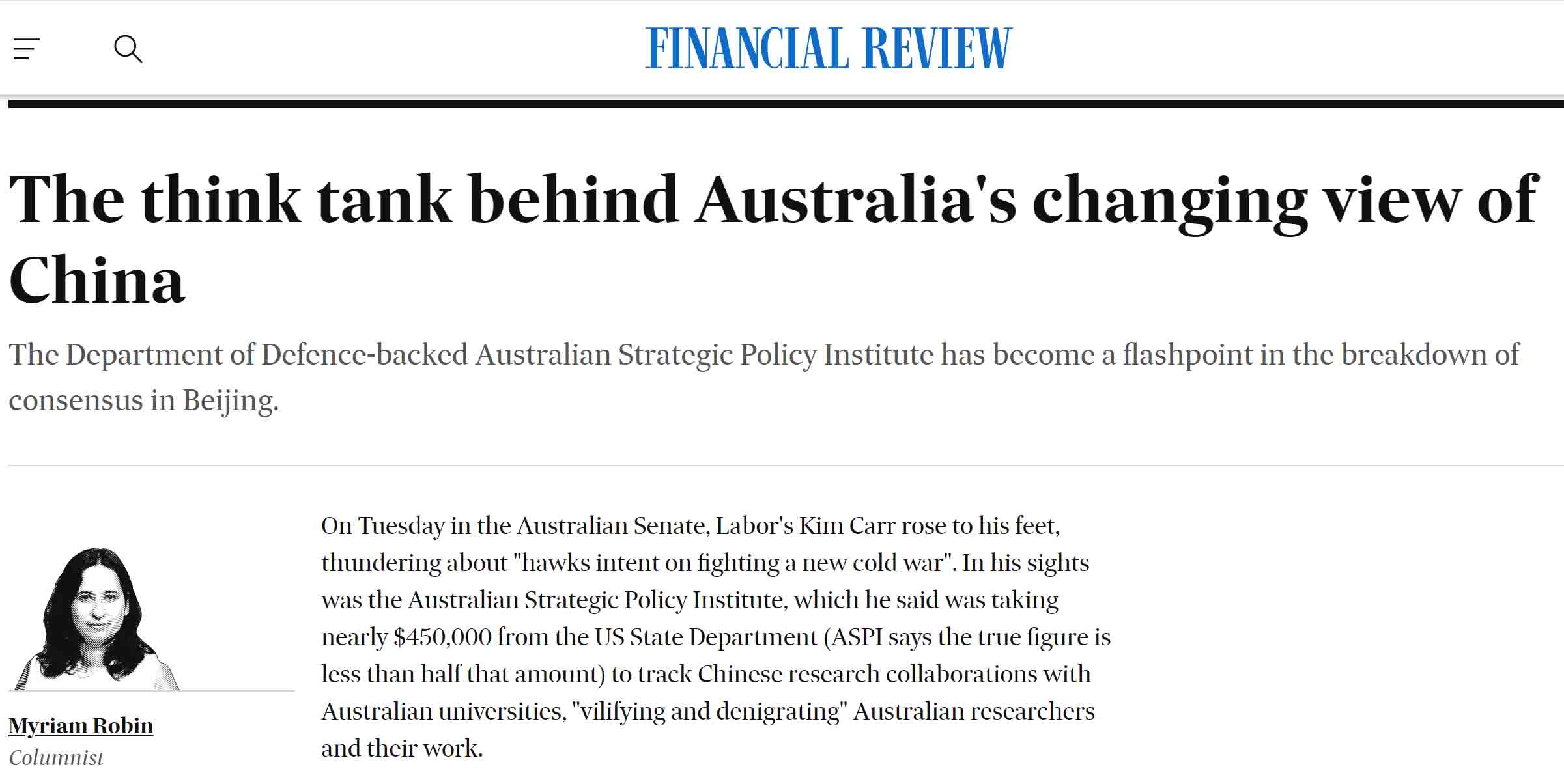

An article on an influential think tank in Australia has questioned the intentions behind its smearing of China, claiming it is being funded by Australia's Department of Defence as well as foreign governments.
The think tank behind Australia's changing view of China, written by columnist Myriam Robin, was recently published in daily Aussie paper Australian Financial Review, and took a closer look at the Australian Strategic Policy Institute (ASPI).

(Screeshot of Myriam Robin's article on the Australian Financial Review)
According to the article, ASPI has come to dominate the Australian public's understanding of China over the past five years. The organization has some staunch supporters, many of whom are in the Australian Parliament, who credit it with raising issues such as Chinese military involvement in Australian universities, the spread of so-called Uygur detention camps in China's Xinjiang Uygur Autonomous Region, and the recent and contested defection of a “Chinese intelligence agent”, who was later proven to be a fraud.
The article, which traces the sources of ASPI's funding and also interviews several experts on China-related issues, claims that the think tank is funded by the Department of Defence of Australia, foreign governments and military contractors, and has been fomenting anti-China hysteria to the alleged benefit of its benefactors.
According to the article, the Howard government “seeded the funding, provided through the Department of Defence, which is the mainstay of ASPI's budget, and will remain so until at least 2022-23, when the current four million Australian dollars funding agreement expires.”
The article also claims that ASPI is constantly seeking to develop alternative sources of funding, and these other sources have grown far faster than its funding from the Department of Defence.
The article says that ASPI's most recent sponsors can be divided into three categories.
The first are defence contractors such as Lockheed Martin, BAE and Northrop Grumman. The second is technology companies like Microsoft, Oracle Australia, Telstra and Google. And finally, there are contributions from foreign governments, many being strategic competitors to China. The article also added that the Foreign Influence Transparency Scheme, a project set up by the government to monitor Chinese government influence in Australia, ironically captured some other recent sources of ASPI funding, including NATO, the US State Department and the UK Foreign and Commonwealth Office.
The article suggests that unlike other academic institutions, ASPI's influence comes partly from its deep engagement with the media. Peter Jennings, the executive director of ASPI, said that he has no interest in running an “ivory tower institution engaged in pure academic research. ”
ASPI’s biased academic ethic and inflammatory rhetoric has led to a slew of criticisms. Former NSW premier Bob Carr has accused it of pumping out a “one-sided, pro-American view of the world”. Veteran foreign editor Tony Walker has slammed its "dystopian worldview" which "leaves little room for viewing China as a potential partner". "It lacks integrity and brings shame to Australia," says retired former DFAT chief and ex-Qantas CEO John Menadue. “I see it as very much the architect of the China threat theory in Australia,” said ex-ambassador to China turned Beijing-based business consultant Geoff Raby. "Public money shouldn't be put into public advocacy anyway," Raby adds. "Objective, balanced, nuanced research is acceptable, but not to fund advocacy of one country’s position vis-a-vis China."
The article also suggests that quite aside from the question of independence, there is a deep-seated cultural appetite in Australia for hawkishness on China. Many don't need much nudging to believe the worst of China and its people. Concerns about xenophobia appear to underlie some of the alarm over public discussion of such issues.

 Award-winning photos show poverty reduction achievements in NE China's Jilin province
Award-winning photos show poverty reduction achievements in NE China's Jilin province People dance to greet advent of New Year in Ameiqituo Town, Guizhou
People dance to greet advent of New Year in Ameiqituo Town, Guizhou Fire brigade in Shanghai holds group wedding
Fire brigade in Shanghai holds group wedding Tourists enjoy ice sculptures in Datan Town, north China
Tourists enjoy ice sculptures in Datan Town, north China Sunset scenery of Dayan Pagoda in Xi'an
Sunset scenery of Dayan Pagoda in Xi'an Tourists have fun at scenic spot in Nanlong Town, NW China
Tourists have fun at scenic spot in Nanlong Town, NW China Harbin attracts tourists by making best use of ice in winter
Harbin attracts tourists by making best use of ice in winter In pics: FIS Alpine Ski Women's World Cup Slalom
In pics: FIS Alpine Ski Women's World Cup Slalom Black-necked cranes rest at reservoir in Lhunzhub County, Lhasa
Black-necked cranes rest at reservoir in Lhunzhub County, Lhasa China's FAST telescope will be available to foreign scientists in April
China's FAST telescope will be available to foreign scientists in April